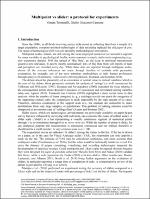Chapter Multipoint vs slider: a protocol for experiments
Author(s)
Tomaselli, Venera
Cantone, Giulio Giacomo
Language
EnglishAbstract
Since the broad diffusion of Computer-Assisted survey tools (i.e. web surveys), a lively debate about innovative scales of measure arose among social scientists and practitioners. Implications are relevant for applied Statistics and evaluation research since while traditional scales collect ordinal observations, data from sliders can be interpreted as continuous. Literature, however, report excessive times of completion of the task from sliders in web surveys. This experimental protocol is aimed at testing hypotheses on the accuracy in prediction and dispersion of estimates from anonymous participants who are recruited online and randomly assigned into tasks in recognition of shades of colour. The treatment variable is two scales: a traditional multipoint 0-10 multipoint vs a slider 0-100. Shades have a unique parametrisation (true value) and participants have to guess the true value through the scale. These tasks are designed to recreate situations of uncertainty among participants while minimizing the subjective component of a perceptual assessment and maximizing information about scale-driven differences and biases. We propose to test statistical differences in the treatment variable: (i) mean absolute error from the true value (ii), time of completion of the task. To correct biases due to the variance in the number of completed tasks among participants, data about participants can be collected through both pre-tasks acceptance of web cookies and post-tasks explicit questions.


 Download
Download Web Shop
Web Shop